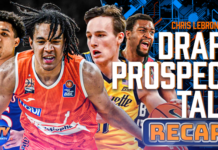The New York Knicks fall to the Atlanta Hawks 111-117. The Knicks’ play-in hopes is fading as their offense sputtered in the fourth quarter.
Catch the full Knicks Fan TV Postgame show on all major podcast platforms below:
• Spotify
• Apple Podcasts
• Google Podcasts
• Stitcher
The New York Knicks’ fleeting play-in hope likely left the building with a loss to the Atlanta Hawks 111-117. New York had no answers for Trae Young or Bogdan Bogdanovic, who combined for 72 points. The game followed a similar trend, with New York leading by as much as 10 in the fourth quarter only to see their lead and momentum evaporate before the final whistle.
This loss was especially grating because coaching decisions seemed to propel it. The Knicks’ best defenders played short minutes and rarely got chances to slow Young or Bogdanovic. RJ Barrett was brilliant for most of the night but ran into poor spacing as a Taj Gibson and Mitchell Robinson front court left defenders free to roam inside. Tom Thibodeau’s distrust for younger players is clear from the distribution of minutes in Julius Randle’s absence.
But Barrett still managed another 30-point night, and Mitchell Robinson posterized Clint Capela. Immanuel Quickley was brilliant, and the rookies put together some exemplary defensive sequences. So let’s dive into each player’s performance to salvage some goodwill from a frustrating loss.
RJ Barrett and the Knicks’ starters hit a wall in the fourth quarter:
Alec Burks: 21 PTS (9/16 FG, 3/7 3PT), 4 AST, 1 REB, 3 STL 1 TO in 36 mins
It was nice to see Alec Burks find his offense. He attacked Trae Young frequently and put the diminutive scorer’s defensive ineptitude on display. Now, Burks did hit his threes and repeatedly drove toward the elbows for pull-up jumpers at a closer distance. The microwave scorer took on the role of second scoring option for the starters.
But Burks bares the brunt of the pain for Trae Young’s success. I’ve complained about his ability to navigate screens far too often in these recaps. He predictably goes under screens or takes too wide of a path over them. That means a lot of switches for ball-handlers to exploit or space to score otherwise. Trae Young spent most of this game picking out his match-ups and attacking those switches comfortably.
I’ll give Burks credit for his four assists and three steals. His extra touches led to some nice passes along the way. His defense was frustrating at times, but he did show effort in passing lanes and help. But it’s impossible to ignore how often defensive miscommunications appeared to begin with a simple screen on Burks and unnecessary switching. As a result, Burks picks up a 2.5 out of 5 for his impact, which entailed plenty of production but insufficient defense.
Evan Fournier: 11 PTS (4/11 FG, 3/9 3PT), 4 AST, 1 REB, 1 STL, 1 TO in 26 mins
Evan Fournier struggled just as much as Burks on defense, but with half the offensive impact to cover. The Hawks frequently attacked Fournier directly, scoring over or around him. That creates a nightmarish dichotomy of using Burks for the switch or picking on Fournier for easy production. This is easily the worst defensive backcourt tandem that Tom Thibodeau can trot out, and their minutes go a long way toward explaining Trae Young’s monster of a night.
Fournier’s offense was a bit of an afterthought. The Knicks played through RJ Barrett, and whoever Trae Young was guarding. Since Burks was the most likely match-up for Young, Fournier became the third ball-handler. The French wing still managed his uptick in assists, but his scoring and efficiency dipped.
This was not a game to leave Fournier out there. I respect his recent efforts, but he is clearly the weak link of an already shoddy perimeter defense. The Hawks took advantage frequently, and his offense did little to make up for it. So Fournier gets a 1.5 out of 5 for poor defense and not enough offense.
RJ Barrett: 30 PTS (9/25 FG, 1/7 3PT, 11/17 FT), 3 AST, 13 REB, 2 STL, 5 TO in 42 mins
We have a tale of two RJ Barretts in this one. Barrett had a brilliant first half, living in the paint and scoring well. He couldn’t buy a three and missed far too many free throws, but the rising star produced regardless. He had 28 points after three quarters had ended, packing in some assists and a load of rebounds along the way.
But then the fourth quarter happened. Barrett shared the floor with a Gibson/Mitchell frontcourt that left very little room in the middle. New York’s top prospect couldn’t trust his jumper and began driving into a crowded paint with no options. He was blocked, turned the ball over, or poorly missed on all but one of his forays inside. The Hawks shut RJ down, and the Knicks’ offense collapsed as a result.
I don’t particularly blame Barrett for the fourth, though. He didn’t have space to operate, and Tom Thibodeau inexplicably chose isolations for Burks over allowing IQ to try and run some plays. That meant that Barrett’s efficiency collapsed in a late flurry after a night he spent nearly matching Trae Young’s production. As a result, RJ Barrett leaves this one with a 2.5 out of 5, dragged down by the ugly fourth quarter.
Obi Toppin: 10 PTS (5/7 FG, 0/1 3PT), 3 AST, 7 REB, 1 STL, 2 TO in 24 mins
With Julius Randle out, we got a chance to see Obi Toppin in an expanded role. He flashed some scoring ability off the dribble and picked up easy points in transition. Toppin also showed off his vision by whipping some nice passes for assists during a strong first-half. After a season of waiting in the corner, we finally saw Obi Toppin as a more dynamic offensive weapon.
But Obi ran into trouble on the defensive end. He had several clear defensive miscommunications over rotations. Even when Toppin switched correctly, he often seemed a step slow, leading to cheap fouls on ball-handlers. That left Obi with five fouls by the middle of the third quarter. Of course, Tom Thibodeau took this as a cue to bench Toppin and leave his offensive impact on the bench for the rest of the half.
But Toppin’s production is pretty impressive, considering he only played 24 minutes. He picked up ten points on high efficiency with seven rebounds and three assists along the way. Another ten minutes might have taken Toppin’s numbers into a more impressive realm, but we have no guarantees he’d have avoided fouls to last. As a result, Toppin gets a 2.5 out of 5, but it could have been higher with less foul trouble.
Mitchell Robinson: 9 PTS (4/6 FG, 1/6 FT), 6 REB, 3 STL, 4 BLK, 2 TO in 35 mins
Two things about Mitchell Robinson’s performance drove me crazy. The first was Mitchell Robinson missing free throws after making some nice moves around the basket for fouls. The second was my realization that a healthy Robinson really could have changed the complexion of last season’s playoff match-up.
I’m confident that Mitch could have made a difference because his defense loomed large over this game. Two of his steals came from snatching alley-oop lobs away. He blocked slashers on the pick and roll and protected the rim in a manner few bigs are capable of. Robinson was a force in the middle, regardless of what his modest rebounding tally might suggest.
The big man also picked up my favorite play of the night when he dunked on Clint Capela. Capela had denied an Obi Toppin dunk earlier and taunted with a Mutombo-like finger wag. That made Robinson’s dunk on the shot blocker sweeter than it already was. Robinson picks up a 3 out of 5 for making New York’s interior defense tough.
Quality defense and IQ’s offense lead New York’s second-unit
Immanuel Quickley: 17 PTS (6/11 FG, 3/5 3PT, 2/3 FT), 2 AST, 5 REB, 2 TO in 25 mins
Immanuel Quickley lies at the heart of my optimism and frustrations from this game. He continued his trend as a focal point for the second unit offense. The sophomore scores in bunches and has recently been hottest in fourth quarters. But this performance included some of his more audacious attempts falling, which was a sweet reminder of last season’s Quickley.
Beyond efficient scoring, I thought the defense looked better while Quickley played. He didn’t turn things around but did manage to challenge shots and stay in front of ball-handlers. These are the low-hanging fruits that a weak starting backcourt leaves for its sixth man. IQ notably gave up some shots where he contested, but the scorers went right over him, but at least there was a contest on the shot.
My frustrations for IQ come down to his lack of assertion in the late fourth. Again, the Knicks struggled as the offense ran through Burks and RJ. Quickley might not be a fully-formed point guard, but he’s the best playmaker for others out of that trio. With those two struggling in isolation, I’d have liked to see the sophomore take the reins and create looks for everyone. But Quickley still comes up with a 3 out of 5 despite taking a backseat late.
Quentin Grimes: 3 PTS (1/3 FG, 1/3 3PT), 2 AST, 2 REB, 2 STL in 12 mins
Quentin Grimes had a few sequences that I enjoyed even in limited minutes. His hands are undeniably good, with two steals and more deflections tallied. He also closed the first quarter by defending Trae Young in isolation with the best man defense of the entire game.
Grimes’ sole field goal was a pretty bit of offense as well. He didn’t settle for his first look, took the lane past a closeout, and made a quick pass. Grimes’ constant motion led him to pass and cut to open space for an open look from three. He has the potential to make the game easier for passers which is a reversal of typical roles. But Grimes only played twelve minutes, so his review remains limited by his playing time.
Jericho Sims: 2 PTS (1/1 FG), 1 AST, 1 REB in 13 mins
We got a very brief glimpse of Jericho Sims’ mobility in a second-half appearance. He came onto the floor and may have been assigned to trap Trae Young. Sims flew well past the three-point line and forced Young to pass the ball. Before anyone could punish the double-team, Sims was sprinting back to cover his big man in the middle. Unfortunately, Sims’ next blitz included contact that sent Young to the line and New York’s rookie center back to the bench.
Sims didn’t stand out for much beyond that. He had a nice finish and chased after boards more than he completed them. But my biggest compliment is that Sims didn’t look out of place in this competitive game. He was punished for a mistake, but I didn’t think he’d have been a detriment with a few more minutes to act. He falls under my fifteen-minute threshold for a full breakdown.
Taj Gibson: 5 PTS (2/5 FG, 1/1 3PT), 5 REB in 20 mins
Taj Gibson entered the game and immediately hit a corner three, followed by a pick and pop mid-range shot. That success wasn’t enough to create gravity, though. The Hawks continually Gibson open while they closed lanes inside and denied others. I feel like everyone saw this going on except for Tom Thibodeau, who played Gibson for the final fifteen minutes of this game…those fifteen minutes are conspicuously when the Knicks’ offense flopped.
But I want to stress that it’s not Gibson’s fault. He was tasked to take on the backup power forward role. That left New York with two traditional centers against a Hawks squad full of perimeter players. Taj wasn’t equipped to punish Atlanta on the perimeter, and Robinson or Sims occupied the middle. That left Gibson with a minimal impact or negative one.
I don’t want to linger on this last point. Trae Young frequently used screens to force match-ups with Taj (or other bigs). Young made Gibson fall in a particularly nice sequence of crossovers. Unfortunately, it was another example of Taj playing out of position and set up to fail.
Miles McBride: 3 PTS (1/1 FG, 1/1 3PT), 1 AST in 8 mins
The Knicks need a point guard. Miles McBride managed 18 assists to 2 turnovers in the G-league just recently. Unfortunately, that wasn’t enough for Tom Thibodeau to give the rookie even ten minutes of action. But we at least got to see McBride knock down a three, pick up an assist, and flash some nice ball denial against Trae Young in their few moments matched up. But that’s all we got because McBride only received eight minutes to work.
Questionable decisions mar Tom Thibodeau’s night
Tom Thibodeau:
Last season, Tom Thibodeau got away with a few questionable decisions about his rotation thanks to the team’s overwhelming success. We all felt Elfrid Payton was struggling, but Thibs stuck to his guns, and it worked out. This season, as everything falls apart, those shoddy choices are a lot easier to question. I bring this up because I’m precariously close to joining the “it’s time for a new coach” team in earnest after last night’s nightmare.
I’ve touched on my complaints throughout this piece. First, Thibodeau stuck to his rotation which meant Burks and Fournier matched up to Trae Young while better defenders got fewer than 15 minutes. Then Young destroyed the Knicks, and Thibodeau didn’t do enough to address it. Afterward, we have Taj Gibson playing more minutes than any rookie while IQ plays less than Burks or Fournier. If the Knicks were winning, I’d understand the choices, but Thibodeau is leaning on vets despite the results being consistent losses down the stretch.
I’ll stop short on calling this all a deal-breaker. Would I prefer to try a new direction? The answer is yes, with increasing enthusiasm after each of these debacles. But I also understand how New York’s reputation with coaches is terrible enough to warrant some pause before making that move. But the Hawks collapse continues a season-long trend that leaves me wondering if Johnnie Bryant could have salvaged at least a few of these losses. Instead, Thibodeau gets a 0 out of 5 for letting Trae Young do the Garden like that.
Closing Thoughts
This season has all the appeal of taking one step forward to stumble three steps backward. Sadly, it feels like last season’s success brought us an array of offseason decisions that have all backfired. The stubborn coach is even more dug in because he was rewarded for it last season. The All-NBA star came in with a chip on his shoulder that took the edge off his game. Last year’s successful vets all regressed or got hurt. Murphy’s Law took a break for one year and came back with a vengeance.
But the real issue with all of these struggling vets is how they impact the youth. There’s a young prospect that shows us flashes off the bench for each wrong decision. Those kids are far from guaranteed to become decent, but they aren’t likely to be much worse when the team plays this poorly. So we’re entering the final ten games of the season with no more hope for a play-in slot and just begging to see these kids get to play in earnest.
I should warn that late-March and early-April success can lead to fool’s gold. A bit of scheduling luck in April can have Toney Douglas looking like Russell Westbrook (the good version). Luckily, I don’t think that will be the case with the Charlotte Hornets, Miami Heat, Chicago Bulls, and Brooklyn Nets all left in this final ten-game stretch. Charlotte is next, and all I’m hoping for is that the rotation will reflect an interest in the future. We’ll see how it goes soon, Knicks fam!
Stay tuned to KnicksFanTV.com for the latest Knicks news, rumors, and recaps throughout the 2021-22 NBA season. And in case you missed it, check out CP’s analysis of Tom Thibodeau’s likely return as the head coach for the New York Knicks.











